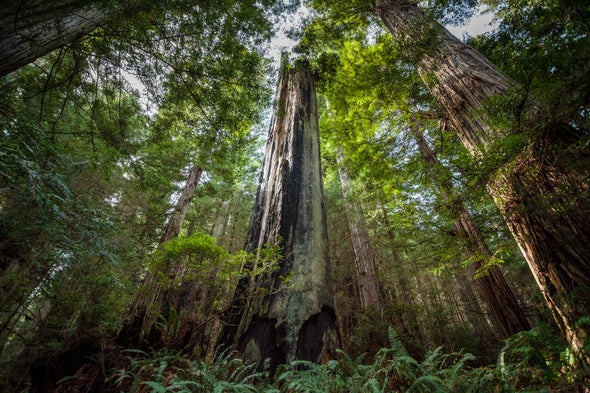Biden will sign an executive order in Seattle today to protect forests as a way to soak up carbon emissions and reduce the effects of global warming.
The order directs the Interior and Agriculture departments to jointly conduct a survey of the nation’s oldest trees on federal lands and develop a plan to protect them. It will also boost local and federal reforestation efforts in the United States and better manage wildfires.
The order is meant to help the United States increase pressure on other countries where deforestation is depleting natural resources at a rapid pace, while decreasing U.S. purchases of agricultural commodities such as beef, palm oil and soy that are grown on illegally deforested lands.
Biden’s announcement caps off a week of Earth Day events that didn’t include any major new climate initiatives, but rather focused on restoring climate and environmental regulations removed by the Trump administration and expanding clean energy.
It comes as Biden has spent weeks pushing for an increase in U.S. oil and gas production, as well as a plan to bolster the use of ethanol in summer.
At an event in Portland, Ore., yesterday, Biden echoed sentiments by past presidents, including Donald Trump.
“We need to declare America’s energy independence,” he said.
Yesterday, more than 130 climate scientists wrote a letter to Biden calling on him to protect old-growth forests, which are mostly remaining on federal lands. The group urged the president to direct federal land management agencies to adopt regulations that would end the logging of mature forests and large trees.
“Older forests provide the most above-ground carbon storage potential on Earth, with mature forests and larger trees driving most accumulation of forest carbon in the critical next few decades,” the scientists wrote. “Left vulnerable to logging, though, they cannot fulfill these vital functions.”
The White House has been repeatedly asked about the fate of its faltering climate agenda as it seeks to ramp up oil production and ethanol blends in the wake of Russia’s war on Ukraine. Deputy White House press secretary Karine Jean-Pierre told reporters yesterday that the administration isn’t leaving behind its climate ambitions.
“We believe we can walk and chew gum, because families need to take their kids to school and go to work, get groceries and go about their lives,” she said. “And sometimes that requires gas today, this month and this year. But at the very same time, we must speed up, not slow down, our transition to clean energy.”
The effort to use Mother Nature as a climate tool is reminiscent of the Trump administration’s featured policy to cut carbon emissions by planting more trees. Biden came into office with the boldest and most aggressive climate plan of any president in history and a pledge to spend $2 trillion on the effort. But that plan is mostly marooned in Congress, which has not advanced his proposed package of $500 billion in clean energy tax credits and spending.
The executive order Biden is signing today will direct 13 federal agencies to conduct the first-ever assessment of the condition of nature within the United States. It will create a report on how the United States can better utilize nature-based solutions to combat carbon dioxide emissions by restoring marshes, planting shade trees and promoting drought-resistant crops. It will also expand federal efforts to collect cones and seeds and to grow seedlings.
One sticking point in the plan is that the White House has not defined what counts as an old-growth forest. Administration officials said they expect to issue a definition before the tree survey is conducted. U.S. forests now absorb an amount of carbon dioxide that is equivalent to more than 10 percent of U.S. annual greenhouse gas emissions, according to the White House.
Part of Biden’s push around Earth Day is to “call on Congress” to do more, White House climate adviser Gina McCarthy said at a Climate Action Summit yesterday.
Most Democrats have backed the White House climate agenda, but Democratic Sen. Joe Manchin of West Virginia, who has earned millions of dollars by transporting coal, has blocked that effort. There are no public signs that the White House and Manchin are close to an agreement on a climate package, and Manchin has spent recent weeks pushing for plans that would boost U.S. oil and gas production.
McCarthy expressed confidence, as she has for months, that the roadblock will soon be removed.
“We’re going to keep pushing; they’re going to move,” she said.
Reprinted from E&E News with permission from POLITICO, LLC. Copyright 2022. E&E News provides essential news for energy and environment professionals.


